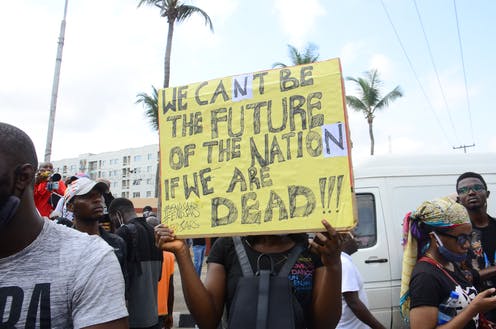As the country searches for a solution to the impasse generated by the #EndSARS protest against police brutality, President Muhammadu Buhari should take his portion of the blame for failing to address the protesters in good time before the protest degenerated into a crisis. His failure in this regard is not only against expectations of Nigerians who wanted a quick resolution of the stand-off, it is a pointer to a high level of contempt for the youth and indeed Nigerians.
On October 12, 2020, just when the #EndSARS Movement was gathering momentum across the country, President Buhari announced the disbandment of the controversial Special Anti-Robbery Squad of the police, the subject of protest. Afraid, justifiably on account of past official attitude, that the disbandment might count for nothing, the youth intensified their campaign against police brutality and for good governance, from the next day.
It is true that some state governors went round pleading for respite from the rampage, but their voices were drowned in the very loud silence from Abuja, which controls the apparatuses of law and order. Nigerians craved for presidential intervention at a critical time, given again that the public disorder of last week was unprecedented in its manner of conduct, and by a group, the youth, that have been least reckoned with by the government. In fact, the president once tagged them as ‘lazy youth.’
But strangely, when the president decided to speak, barely a week into the protest, what he did not say were much louder than what he said. He neither commiserated with the families of youth who were killed on various fronts in the storm, nor did he attempt to explain why armed uniform men shot recklessly at orderly protesters. No reference to the ghastly incident at the Lekki tollgate at all in the president’s 26 minutes broadcast to the nation on edge!
It is therefore still curious why our president chose to ignore the protesters. This omission, in our opinion, is tantamount to a direct slap on Nigerians who are touched, one way or the other, by the protest. This presidential gaffe is antithetical to a culture of democracy he is superintending in Africa’s most populous nation. Democracy is simply the government of the people by the people for the people. As a public officer who is supposed to represent all Nigerians and pander to their interest, there is nothing in the president’s silence on the protest, to suggest that he is the man the protesting children addressed as ‘our father’ when they raised the flag of the country with the rendition of the country’s national anthem.
Moreover, it is on record that the leadership of the National Assembly, having studied the situation of the protest, met physically with, and appealed to Buhari to address the nation. After the meeting on Sunday, October 18, the Senate urged President Buhari to address the nation and set up a judicial commission of inquiry to investigate alleged extra-judicial killings by the disbanded SARS.
In addition, the Senate urged all tiers of government to put in place and sustain policies and programmes of socio-economic reforms that could raise the standard and quality of life of Nigerians. The upper house members also advised that the federal government should implement all the five points of demand of the #EndSARS Movement and protesters, with necessary timelines to rekindle confidence in the government.
It is in the main disheartening that all the appeals for restraint were ignored by the president. And now, the consequence of failure to listen to wise counsel in crisis time is that the commander-in-chief and his armed forces are now in search of a strategy to manage a public relations tragedy, triggered by, ‘we-were-not-there denial to ‘we-were-there-but- on-the-invitation-of-the-Lagos-State-governor confession. This is definitely not how to get the armed forces involved in nurturing democracy in the most populous black nation on earth. Finally, this is therefore a time to reflect on the reason for this season of lamentation: despoliation of the police force, which should ordinarily be the focal point of internal security even in a global context. Let’s, therefore, turn to how to rebuild the Nigeria Police Service as a way of remorse for the debacle of #October 20-10-2020.



